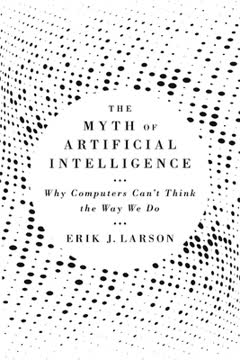Key Takeaways
1. AI is revolutionizing industries and daily life, offering immense potential and challenges
"AI will impact every area of our lives, in some ways that we can't even predict, whether we like it or not."
AI is ubiquitous. From personalized product recommendations to voice-activated assistants, artificial intelligence has already become an integral part of our daily lives. Industries such as healthcare, finance, and transportation are being transformed by AI technologies, leading to improved efficiency, accuracy, and novel solutions to complex problems.
Potential and challenges coexist. While AI offers tremendous opportunities for innovation and progress, it also presents significant challenges. These include:
- Privacy concerns related to data collection and usage
- Potential job displacement due to automation
- Ethical considerations in AI decision-making
- The need for updated regulations and policies
As AI continues to evolve, it is crucial for individuals, businesses, and governments to stay informed and actively engage in shaping its development and implementation.
2. Machine learning and deep learning are driving AI advancements across various fields
"Machine learning uses algorithms to learn from data patterns."
Understanding AI foundations. Machine learning, a subset of AI, enables computers to learn and improve from experience without explicit programming. This capability has led to breakthroughs in various domains:
- Image and speech recognition
- Natural language processing
- Predictive analytics
- Autonomous systems
Deep learning takes it further. As a subset of machine learning, deep learning uses neural networks with multiple layers to analyze complex patterns in large datasets. This technology has enabled significant advancements in:
- Computer vision
- Language translation
- Medical diagnosis
- Gaming AI
The rapid progress in these fields is driving innovation across industries, from healthcare and finance to entertainment and scientific research.
3. AI is transforming business processes, from customer service to decision-making
"AI technologies are starting to have a seat at the table when it comes to making leadership decisions within companies."
Enhanced efficiency and insights. AI is revolutionizing how businesses operate by:
- Automating routine tasks
- Providing data-driven insights for decision-making
- Personalizing customer experiences
- Optimizing supply chains and logistics
AI-powered tools for businesses:
- Chatbots for customer service
- Predictive analytics for market trends
- AI-assisted hiring and talent management
- Automated accounting and financial analysis
As AI becomes more sophisticated, it is increasingly being integrated into high-level decision-making processes, offering valuable insights and recommendations to leadership teams.
4. Chatbots and virtual assistants are becoming essential tools for communication and productivity
"Chatbots could provide people with networks through which we can communicate and share information, they can also have social drawbacks."
AI-powered communication. Chatbots and virtual assistants are revolutionizing how businesses interact with customers and how individuals manage their daily tasks. These tools offer:
- 24/7 availability for customer support
- Personalized recommendations and assistance
- Efficient scheduling and task management
- Multilingual communication capabilities
Balancing benefits and limitations. While chatbots offer numerous advantages, it's important to consider their limitations:
- Potential for misunderstandings in complex situations
- The need for human oversight in sensitive matters
- Privacy concerns related to data collection
- The importance of maintaining human-to-human connections
As these technologies continue to improve, finding the right balance between AI-assisted and human-led communication will be crucial for businesses and individuals alike.
5. The job market is evolving rapidly due to AI, requiring new skills and adaptability
"Every job which takes less than 5 seconds to think will be done by robots."
Job market transformation. AI and automation are reshaping the employment landscape:
- Routine and repetitive tasks are increasingly automated
- New roles are emerging in AI development and implementation
- Soft skills like creativity and emotional intelligence are gaining importance
- Continuous learning and adaptability are becoming essential
Preparing for the future of work:
- Develop skills that complement AI, such as critical thinking and problem-solving
- Embrace lifelong learning and stay updated on technological advancements
- Focus on uniquely human skills that are difficult to automate
- Consider reskilling or upskilling in growing fields related to AI and data science
As AI continues to evolve, it's crucial for individuals and organizations to anticipate changes and proactively adapt to the shifting job market.
6. Self-driving cars and autonomous vehicles will reshape transportation and urban planning
"Self-driving cars will likely create amazing opportunities for entrepreneurs and businesses worldwide and also increase productivity."
Revolutionary transportation. Autonomous vehicles are set to transform not only how we travel but also how cities are designed and operated:
- Increased safety through reduced human error
- Improved traffic flow and reduced congestion
- More efficient use of parking spaces and urban land
- New business models in transportation and logistics
Challenges and considerations:
- Regulatory and legal frameworks for autonomous vehicles
- Ethical decision-making in emergency situations
- Infrastructure adaptations to support self-driving technology
- Social and economic impacts on traditional transportation jobs
As self-driving technology matures, it will be essential for policymakers, urban planners, and businesses to collaborate in shaping the future of transportation and city design.
7. Robots powered by AI are changing manufacturing, healthcare, and home environments
"The basic idea of having robots is to help us with tasks, not to change who we are as human beings."
Diverse applications of robotics. AI-powered robots are increasingly being utilized across various sectors:
- Manufacturing: Improving efficiency and precision in production
- Healthcare: Assisting in surgeries and patient care
- Home automation: Performing household tasks and providing companionship
- Agriculture: Enhancing crop management and harvesting
Balancing automation and human touch. As robots become more prevalent, it's crucial to:
- Define appropriate roles for robots in different environments
- Ensure human oversight and control in critical situations
- Address ethical concerns related to robot-human interactions
- Maintain a focus on enhancing human capabilities rather than replacing them
The integration of robots into our daily lives offers numerous benefits but requires careful consideration of their impact on society and human relationships.
8. Major tech companies are driving AI innovation and shaping its future applications
"Nearly every large technology company out there has placed a high priority on the development and application of artificial intelligence."
Tech giants leading the way. Companies like Google, Amazon, Facebook, Microsoft, and IBM are at the forefront of AI research and development:
- Investing billions in AI technologies
- Developing powerful AI platforms and tools
- Applying AI across their products and services
- Shaping the direction of AI innovation
Key areas of focus:
- Natural language processing and understanding
- Computer vision and image recognition
- Machine learning and deep learning algorithms
- AI-powered cloud services and platforms
The competition among these tech giants is driving rapid advancements in AI capabilities, influencing how businesses and individuals will interact with technology in the future.
9. Ethical considerations and potential risks of AI must be addressed proactively
"Everyone is responsible for the things they create, saying, 'Many of the companies are cheap on the ethical side. They need to self-regulate. They need to accept responsibility. And if they don't do that, then I think we need to do it for them.'"
Navigating ethical challenges. As AI becomes more powerful and pervasive, addressing ethical concerns is crucial:
- Ensuring transparency and accountability in AI decision-making
- Protecting privacy and data security
- Mitigating bias in AI algorithms and datasets
- Considering the societal impact of AI-driven automation
Proactive measures:
- Developing ethical guidelines for AI development and deployment
- Encouraging interdisciplinary collaboration in AI research
- Implementing robust testing and validation processes for AI systems
- Educating the public about AI capabilities and limitations
Addressing these ethical considerations early on will help build trust in AI technologies and ensure their responsible development and use.
10. Preparing for the AI era requires embracing technology while preserving human qualities
"Embrace technology, but don't become it."
Balancing technological advancement and human values. As we enter the AI era, it's crucial to:
- Leverage AI to enhance human capabilities, not replace them
- Cultivate uniquely human skills like creativity and emotional intelligence
- Maintain critical thinking and decision-making abilities
- Prioritize human connections and social interactions
Strategies for thriving in the AI era:
- Stay informed about AI developments and their potential impacts
- Develop a growth mindset and embrace lifelong learning
- Focus on skills that complement AI, such as complex problem-solving
- Engage in discussions about the ethical implications of AI
By striking a balance between technological adoption and preserving human qualities, we can harness the benefits of AI while maintaining our essential humanity.
Last updated:
FAQ
What's Artificial Intelligence: 101 Things You Must Know Today About Our Future about?
- Comprehensive Introduction: The book offers a thorough introduction to artificial intelligence (AI), highlighting its current significance and potential future impact on various sectors.
- Practical Applications: It explores how AI is transforming industries like finance, healthcare, education, and marketing, providing real-world examples.
- Personal and Professional Integration: Lasse Rouhiainen emphasizes how individuals can incorporate AI into their personal and professional lives, making it accessible to everyone.
Why should I read Artificial Intelligence: 101 Things You Must Know Today About Our Future?
- Stay Informed: The book helps readers understand rapid AI advancements and their effects on daily life and business operations.
- Practical Insights: It offers methods for integrating AI into life and work, relevant for personal growth and professional development.
- Expert Guidance: Insights from leading AI experts and additional resources enhance the reader's knowledge base.
What are the key takeaways of Artificial Intelligence: 101 Things You Must Know Today About Our Future?
- AI's Transformative Potential: AI is likened to "the new electricity," indicating its transformative potential across all sectors.
- Job Market Impact: The book discusses potential job losses due to automation and the need for workforce adaptation.
- Ethical Considerations: Emphasizes the importance of ethical AI development and societal implications.
How does Artificial Intelligence: 101 Things You Must Know Today About Our Future define artificial intelligence?
- AI Definition: AI is defined as the theory and development of computer systems capable of performing tasks that require human intelligence, such as decision-making and language translation.
- Learning Mechanism: AI systems learn from data and make decisions based on that learning, similar to human cognitive processes.
- Practical Examples: Examples like image recognition and natural language processing illustrate AI's capabilities.
What are some common AI applications discussed in Artificial Intelligence: 101 Things You Must Know Today About Our Future?
- Healthcare Innovations: AI is used for predictive analytics in patient care, improving diagnosis and treatment efficiency.
- Finance Automation: Enhances customer service through chatbots and automates investment strategies with robo-advisors.
- Marketing Tools: Includes personalized content recommendations and predictive analytics for consumer behavior.
What are the advantages and disadvantages of AI as outlined in Artificial Intelligence: 101 Things You Must Know Today About Our Future?
- Advantages: AI improves efficiency, reduces costs, and enhances decision-making processes across industries.
- Disadvantages: Potential job displacement, ethical concerns regarding privacy, and increased social isolation risks.
- Balanced Perspective: Encourages considering both benefits and challenges, advocating for responsible AI development.
How is AI changing the job market according to Artificial Intelligence: 101 Things You Must Know Today About Our Future?
- Job Displacement: Up to 47% of jobs could be automated, leading to significant workforce changes.
- Emerging Opportunities: New roles in AI development, data analysis, and tech support will emerge, requiring new skills.
- Need for Reskilling: Emphasizes the importance of reskilling to remain competitive in the evolving job market.
What are some ethical considerations regarding AI mentioned in Artificial Intelligence: 101 Things You Must Know Today About Our Future?
- Privacy Concerns: Highlights the need for ethical guidelines to protect user data and ensure responsible AI usage.
- Bias in AI: Discusses the risk of bias in AI algorithms, leading to unfair treatment based on race, gender, or socioeconomic status.
- Human Oversight: Stresses maintaining human oversight in AI decision-making to uphold ethical standards.
How does Artificial Intelligence: 101 Things You Must Know Today About Our Future suggest individuals can apply AI in their lives?
- Personal Use Cases: Examples include using AI tools for personal productivity, like virtual assistants for scheduling.
- Professional Integration: Encourages leveraging AI in work processes, from automating tasks to enhancing customer interactions.
- Continuous Learning: Advocates for ongoing education in AI technologies to stay relevant and informed.
What are the different levels of self-driving car technologies discussed in Artificial Intelligence: 101 Things You Must Know Today About Our Future?
- Level 0 - No Automation: Human drivers are fully in control, with no automated assistance.
- Level 2 - Partial Automation: Vehicles assist with tasks like acceleration and steering, but drivers must remain engaged.
- Level 5 - Full Automation: Vehicles operate without human intervention in all conditions, representing the ultimate goal.
What are the best quotes from Artificial Intelligence: 101 Things You Must Know Today About Our Future and what do they mean?
- Supportive Role of AI: "Machines and artificial intelligence can’t substitute for human beings, but they can provide knowledge, possibilities, and support for peace processes."
- Irreversible Nature of AI: "Once this Pandora’s Box is opened, it will be hard to close."
- Balance with Technology: "Embrace technology, but don’t become it."
How can I prepare for the era of AI as suggested in Artificial Intelligence: 101 Things You Must Know Today About Our Future?
- Educate Yourself: Learn about AI technologies and their implications to adapt to changes in personal and professional life.
- Embrace Technology: Use AI tools in daily tasks to become familiar with their capabilities.
- Engage in Discussions: Participate in conversations about AI ethics and societal impacts to foster understanding and promote responsible use.
Review Summary
Artificial Intelligence: 101 Things You Must Know Today about Our Future receives mixed reviews. Readers appreciate its accessible overview of AI concepts and applications for beginners. However, some criticize its simplistic writing style, repetitive content, and lack of depth for more knowledgeable readers. The book covers AI's impact on various industries, potential job displacement, and ethical concerns. While some find it informative and thought-provoking, others feel it lacks originality and up-to-date information. Overall, it's considered a decent introduction to AI for newcomers but may not satisfy those seeking more advanced insights.
Similar Books










Download PDF
Download EPUB
.epub digital book format is ideal for reading ebooks on phones, tablets, and e-readers.





